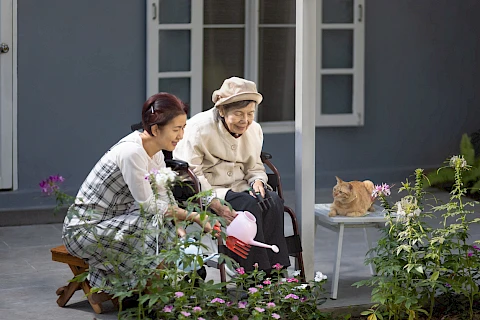
Gardening is more than just a hobby; it's a way for seniors to stay active and enjoy nature. For seniors with Parkinson's, gardening can offer mental and physical benefits such as improved mood, increased flexibility, and a sense of accomplishment. However, traditional gardening can present challenges. That's where adaptive gardening comes into play. This approach focuses on making gardening accessible through specialized techniques and tools. Senior Helpers will explore adaptive gardening for Canadian seniors with Parkinson's and offer tips for their caregivers.
Parkinson's and Gardening Challenges
Parkinson's disease affects movement and can make tasks like gardening more difficult. Seniors with Parkinson's may experience tremors, coordination difficulties, and stiffness, hindering their ability to engage in traditional gardening. However, with some adjustments and the right support, caregivers can help seniors overcome these challenges. Our goal is to make gardening enjoyable and manageable.
Choosing Low-Maintenance Plants
When it comes to adaptive gardening, selecting the right plants is key. Look for low-maintenance plants that can thrive with minimal care. This reduces the physical demand on seniors and allows for more time to enjoy the garden. Consider these resilient options:
- Lavender: Known for its calming scent and ease of care.
- Hostas: These perennials require little maintenance and are perfect for shaded areas.
- Daylilies: They are hardy and come in a variety of colours to brighten any garden.
These plants beautify the garden and limit the need for constant upkeep, making gardening a more sustainable activity for seniors with Parkinson's.
Specialized Gardening Tools
Adaptive gardening tools are specially designed to assist with grip, reach, and mobility, making them perfect for seniors with Parkinson's. These tools often have ergonomic and long handles to reduce bending and straining.
For example, tools like easy-grip trowels and extendable pruning shears can make a world of difference. Many local Canadian garden centres and online retailers, such as Home Hardware and Canadian Tire, stock these adaptive tools. By investing in them, caregivers can help ease the gardening process.
Accessible Gardening Techniques
Creating an adaptive garden that is both accessible and enjoyable starts with smart planning. Raised bed gardening and container gardening are popular techniques that bring plants to a manageable height, reducing the need for bending.
Consider designing a garden layout with wide, smooth paths for easy navigation with mobility aids if needed. Pacing is also important to incorporate into the gardening routine. Remind seniors to take regular breaks to prevent fatigue, ensuring their gardening experience remains positive. Seniors should always consult a doctor before starting a new exercise routine.
Creating an Enjoyable Gardening Experience
Focus on creating a serene and relaxing environment to maximize the benefits of adaptive gardening. Encourage seniors to enjoy the garden's sensory elements, like the scent of flowers or the feeling of earth between their fingers.
Caregivers should also participate in the gardening process, offering assistance and companionship. Not only is this a chance to bond, but it also ensures safety and can be a learning experience for both parties. Spending time in nature aids in reducing stress and enhancing overall well-being.
Discover Support With Gardening for Seniors
Adaptive gardening is a rewarding activity that offers numerous benefits for seniors with Parkinson's. By choosing low-maintenance plants, using specialized tools, and employing accessible gardening techniques, caregivers can create a safe and enjoyable environment. Encourage seniors to get involved and experience the joy of gardening.
To learn more about how Senior Helpers can assist seniors with Parkinson's in Canada, contact us today. Gardening might be the perfect addition to your caregiving routine, offering growth not just for plants but also for minds and spirits.